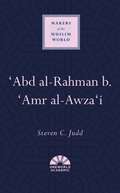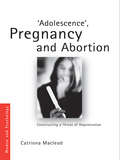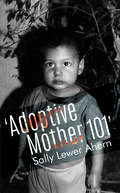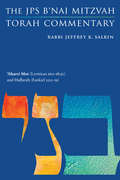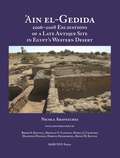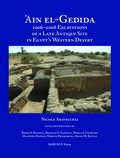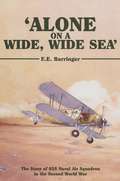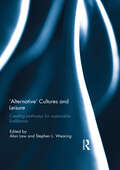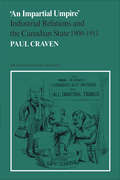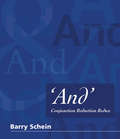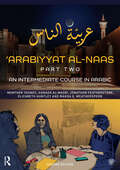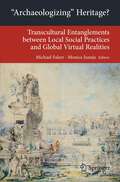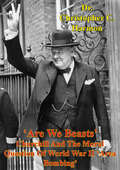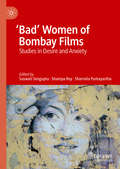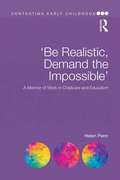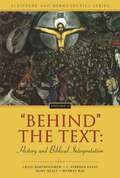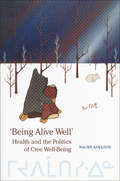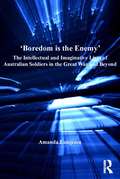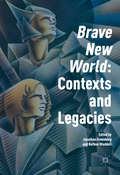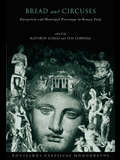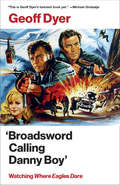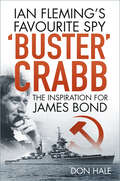- Table View
- List View
'Abd al-Rahman b. 'Amr al-Awza'i (Makers of the Muslim World)
by Steven C. Judd&‘Abd al-Rahman b. &‘Amr al-Awza&‘i (c.707–774) was Umayyad Syria&’s most influential jurist, part of a generation of scholars who began establishing the first formal structures for the preservation and dissemination of religious knowledge. Following the Abbasid revolution, they provided a point of stability in otherwise unstable times. Despite his close ties to the old regime, al-Awza&‘i continued to participate in legal and theological matters in the Abbasid era. Although his immediate impact would prove short-lived, his influence on aspects of Islamic law, particularly the laws of war, endures to this day.
'Adolescence', Pregnancy and Abortion: Constructing a Threat of Degeneration (Women and Psychology)
by Catriona I. MacleodWinner of the Rhodes University Vice-Chancellor's Book Award 2012! Winner of the 2011 Distinguished Publication Award of the Association for Women in Psychology! Why, despite evidence to the contrary, does the narrative of the negative consequences of teenage pregnancy, abortion and childbearing persist? This book argues that the negativity surrounding early reproduction is underpinned by a particular understanding of adolescence. It traces the invention of "adolescence" and the imaginary wall that the notion constructs between young people and adults. Macleod examines the entrenched status of "adolescence" within a colonialist discourse that equates development of the individual with the development of civilisation, and the consequent threat of degeneration that "adolescence" implies. Many important issues are explored, such as the invention of teenage pregnancy and abortion as a social problem; issues of race, culture and tradition in relation to teenage pregnancy; and health service provider practices, specifically in relation to managing risk. In the final chapter, an argument is made for a shift from the signifier "teenage pregnancy" to "unwanted pregnancy". Using data gathered from studies worldwide, this book highlights central issues in the global debate concerning teenage pregnancy. It is ideal for academics, and students of health psychology, women’s studies, nursing and sociology, as well as practitioners in the fields of youth and social work, medicine and counselling.
'Adoptive Mother 101'
by Sally AhernAnother woman, whose name you know, gave birth to your son. How on earth do you deal with that? How do you deal with people looking at you, and then looking at your son, and you see the moment in their eyes when it registers that you do not look like each other? Sally Lewer Ahern's memoir, 'Adoptive Mother 101', is a moving and uplifting account of the complex and emotionally gruelling odyssey of adopting her son, Carlos, from Guatemala, when he was almost three years old. It is a story of love, of creating her family through intercountry adoption. Told via a series of vignettes from the portholes of her intercountry adoption quest, 'Adoptive Mother 101' is not only about the bumpy road which is intercountry adoption, it's about clutching on to mercurial hope, clinging to vicarious dreams … and to trusting blindly and determinedly in the unpredictability of the Universe. Not only for those with an interest in intercountry adoption - it's for anyone, anywhere, who has ever had hopes and dreams.
'Aharei Mot: The JPS B'nai Mitzvah Torah Commentary (JPS Study Bible)
by Rabbi Jeffrey K. Salkin'Aharei Mot (Leviticus 16:1-18:30) and Haftarah (Ezekiel 22:1-19): The JPS B’nai Mitzvah Torah Commentary shows teens in their own language how Torah addresses the issues in their world. The conversational tone is inviting and dignified, concise and substantial, direct and informative. Each pamphlet includes a general introduction, two model divrei Torah on the weekly Torah portion, and one model davar Torah on the weekly Haftarah portion. Jewish learning—for young people and adults—will never be the same. The complete set of weekly portions is available in Rabbi Jeffrey K. Salkin’s book The JPS B’nai Mitzvah Torah Commentary (JPS, 2017).
'Ain el-Gedida: 2006-2008 Excavations of a Late Antique Site in Egypt's Western Desert (Amheida IV) (ISAW Monographs #8)
by Nicola AravecchiaThe fourth volume in the Amheida series, ‘Ain el-Gedida: 2006-2008 Excavations of a Late Antique Site in Egypt's Western Desert (Amheida IV) presents the systematic record and interpretation of the archaeological evidence from the excavations at ‘Ain el-Gedida, a fourth-century rural settlement in Egypt's Dakleh Oasis uniquely important for the study of early Egyptian Christianity and previously known only from written sources.Nicola Aravecchia (Washington University), the Deputy Field Director of NYU's Amheida Excavations, offers a history of the site and its excavations, followed by an integrated topographical and archaeological interpretation of the site and its significance for the history of Christianity in Egypt. In the second half of the volume a team of international experts presents catalogs and interpretations of the archaeological finds, including ceramics (Delphine Dixneuf, CRNS), coins (David M. Ratzan, NYU), ostraca and graffiti (Roger S. Bagnall, NYU and Dorota Dzierzbicka, University of Warsaw), small finds (Dorota Dzierzbicka, University of Warsaw), and zooarcheological remains (Pamela J. Crabtree, NYU and Douglas Campana).
'Ain el-Gedida: 2006-2008 Excavations of a Late Antique Site in Egypt's Western Desert (ISAW Monographs #8)
by Nicola AravecchiaThe fourth volume in the Amheida series, ‘Ain el-Gedida: 2006-2008 Excavations of a Late Antique Site in Egypt's Western Desert presents the systematic record and interpretation of the archaeological evidence from the excavations at ‘Ain el-Gedida, a fourth-century rural settlement in Egypt's Dakleh Oasis uniquely important for the study of early Egyptian Christianity and previously known only from written sources. <p><p>Nicola Aravecchia (Washington University), the Deputy Field Director of NYU's Amheida Excavations, offers a history of the site and its excavations, followed by an integrated topographical and archaeological interpretation of the site and its significance for the history of Christianity in Egypt. In the second half of the volume a team of international experts presents catalogs and interpretations of the archaeological finds, including ceramics (Delphine Dixneuf, CRNS), coins (David M. Ratzan, NYU), ostraca and graffiti (Roger S. Bagnall, NYU and Dorota Dzierzbicka, University of Warsaw), small finds (Dorota Dzierzbicka, University of Warsaw), and zooarcheological remains (Pamela J. Crabtree, NYU and Douglas Campana).
'Alone on a Wide, Wide Sea': The Story of 835 Naval Air Squadron in the Second World War
by E.E. BarringerThis is the story of 835 Naval Air Squadron as told by one of its surviving officers. It tells the story of the outstanding fleets of flying and the importance of the Merchant Navy in the Second World War.
'Alternative' cultures and leisure: Creating pathways for sustainable livelihoods
by Stephen L. Wearing Alan LawContemporary discourse on sustainability points to the need for substantial, if not radical, shifts in relations between productivity, environment, consumption and identities, in ways which bring or restore balance to the intersecting domains. The catchphrase of ‘sustainability’ has made its way into mainstream discourse on the heels of the ongoing global financial crisis and responses to global warming. The literature of leisure, sport and particularly tourism are replete with fine examples of ‘sustainability’, contributing to full ecology planning approaches. This book aims to stimulate debate and discussion within the leisure studies community about the roles of ‘alternative cultures’ in producing viable models of sustainable relations between work, leisure and environment. Key elements of these discussions, such as participatory democracy and deep ecology, have long been characteristic of cultural configurations loosely called ‘counter’ or ‘alternative’ to a voracious, hierarchical and unconscious modernity. However the leisure studies community has largely neglected their significance up until now. How are leisure, sustainable livelihoods and ‘alternative’ cultures connected, and what influence do they have? This book was originally published as a special issue of Annals of Leisure Research.
'An Impartial Umpire': Industrial Relations and the Canadian State 1900-1911
by Paul CravenThis book is an insightful and detailed analysis of Canadian labour relations policy at the beginning of the 20th century, and of the formulation of distinctive features which still characterize it today. The development and reception of this policy are explained as a product of ideological and economic forces. These include the impact of international unionism on the Canadian working class, the emergence of scientific management in business ideology, and the special role of the state in economic development and the mediation of class relationships.The ideas and career of Mackenzie King, including his 'new liberalism,' and his activities in regard to the Department of Labour are examined, revealing how he moulded Canada's official position in the relations between capital and labour. With a focus on King's intellectual qualities in an international context, the author brings out another dimension, portraying him as Canada's first practising social scientist.The book examines implementation of policy through an analysis of the work of the Department of Labour through detailed case studies of government interventions in industrial disputes. The initial acceptance of the labour relations policy by the labour movement is explained and its repudiation in 1911 is examined against a background of setbacks which reflected its practical limits as much as its philosophical orientation. The result is a study which moves beyond a particular concern with labour policy to illuminate the contours of Canadian life in a crucial period of national development.
'And': Conjunction Reduction Redux (The\mit Press Ser.)
by Barry ScheinA bold argument that “and” always means “&,” the truth-functional sentential connective.In this book, Barry Schein argues that “and” is always the sentential logical connective with the same, one, meaning. “And” always means “&,” across the varied constructions in which it is tokened in natural language. Schein examines the constructions that challenge his thesis, and shows that the objections disappear when these constructions are translated into Eventish, a neo-Davidsonian event semantics, and, enlarged with Cinerama Semantics, a vocabulary for spatial orientation and navigation. Besides rescuing “and” from ambiguity, Eventish and Cinerama Semantics solve general puzzles of grammar and meaning unrelated to conjunction, revealing the book's central thesis in the process: aspects of meaning mistakenly attributed to “and” are discovered to reflect neighboring structures previously unseen and unacknowledged.Schein argues that Eventish and Cinerama Semantics offer a fundamental revision to clause structure and what aspects of meaning are represented therein. Eventish is distinguished by four features: supermonadicity, which enlarges verbal decomposition so that every argument relates to its own event; descriptive event anaphora, which replaces simple event variables with silent descriptive pronouns; adverbialization, which interposes adverbials derived from the descriptive content of every DP; and AdrPs, which replace all NPs with Address Phrases that locate what nominals denote within scenes or frames of reference.With 'And,' Schein rehabilitates an old rule of transformational, generative grammar, answering the challenges to it exhaustively and meticulously.
'Arabiyyat al-Naas (Part Two): An Intermediate Course in Arabic
by Makda Weatherspoon Munther Younes Jonathan Featherstone Hanada Al-Masri Elizabeth Huntley‘Arabiyyat al-Naas (Part Two) is an Arabic language textbook designed to bring learners from a lower to a higher intermediate level of language proficiency. Using the Common European Framework Reference, it takes the learner from B.1 to B.2 and, in terms of the levels of the American Council on the Teaching of Foreign Languages, it takes the learner from Intermediate Low to Intermediate High/Advanced Low. The book is a continuation of the first level books in this series (either Arabiyyat al-Naas fii Bilaad al-Shaam or Arabiyaat al-Naas fii maSr ) and follows the Integrated Approach to Arabic instruction. It is a theme-based textbook delivered in the form of a serialized radio drama. Through the lens of journalism and personal interactions modelled by the main characters of this radio drama, learners are equipped to continue developing their spoken and written Arabic skills in the context of authentic dialogues and reading texts. As such, this book reflects cross-dialectal communication as used by native speakers across the Arab world.
'Arabiyyat al-Naas (Part Two): An Intermediate Course in Arabic
by Makda Weatherspoon Munther Younes Jonathan Featherstone Hanada Al-Masri Elizabeth HuntleyArabiyyat al Naas (Part Two): An Intermediate Course in Arabic, second edition, offers a vibrant course in Arabic as it is written and spoken today by educated native speakers. It is a theme-based textbook delivered in the form of a serialized radio drama. Through the lens of journalism and personal interactions modelled by the main characters of this radio drama, learners are equipped to continue developing their spoken and written Arabic skills in the context of authentic dialogues and reading texts. As such, this book reflects cross-dialectal communication as used by native speakers across the Arab world.Features include: Twenty-one theme-based units covering a wide range of relevant and engaging topics Thorough coverage of listening, speaking, writing and reading skills in every unit, with lessons structured to provide students with variety, stimulation and further opportunities for practice Humorous, realistic dialogues reflecting everyday educated speech among Arabs to build up strong and practical communication skills Free companion website (www.routledge.com/cw/younes) featuring extensive audio recordings of the listening materials in the textbook, videos that supplement the textbook, and texts of the listening passages in the textbook Developed by an experienced and dynamic author team and tested over a number of years at Cornell University, Arabiyyat al Naas (Part Two) will be an essential resource for intermediate-level students of Arabic. While primarily designed for classroom use, the accessibility of the course also renders it highly suitable for independent study. Using the Common European Framework Reference, it takes the learner from B.1 to B.2 and, in terms of the levels of the American Council on the Teaching of Foreign Languages, it takes the learner from Intermediate Low to Intermediate High/Advanced Low.This volume is the second in a pioneering three-part series of Arabic textbooks which together provide a complete three-year undergraduate language program.
'Archaeologizing' Heritage?: Transcultural Entanglements between Local Social Practices and Global Virtual Realities (Transcultural Research – Heidelberg Studies on Asia and Europe in a Global Context)
by Michael Falser Monica JunejaThis book investigates what has constituted notions of "archaeological heritage" from colonial times to the present. It includes case studies of sites in South and Southeast Asia with a special focus on Angkor, Cambodia. The contributions, the subjects of which range from architectural and intellectual history to historic preservation and restoration, evaluate historical processes spanning two centuries which saw the imagination and production of "dead archaeological ruins" by often overlooking living local, social, and ritual forms of usage on site. Case studies from computational modelling in archaeology discuss a comparable paradigmatic change from a mere simulation of supposedly dead archaeological building material to an increasing appreciation and scientific incorporation of the knowledge of local stakeholders. This book seeks to bring these different approaches from the humanities and engineering sciences into a trans-disciplinary discussion.
'Are We Beasts' Churchill And The Moral Question Of World War II 'Area Bombing'
by Dr Christopher C. HarmonThis historical reassessment of the World War II British bombing campaign notes that though in 1940 Churchill declared that he was waging “a military and not a civilian war” to destroy “military objectives” and not “women and children,” within eighteen months both types of targets would be struck by Bomber Command. The author searches for the reasons in “three contiguous realms” of strategic influence: moral (and legal), political, and military. The study concludes that although for much of the war “area bombing” of cities was a “tragic necessity” meeting the ‘reasonable man’s’ standard of what was decently allowable given the blunt weapons the Allies had” and the evils they faced, nonetheless Allied leaders could have and should have abandoned indiscriminate bombing in the last phases of the conflict, when more precise means were at hand and “Nazi power had been overmatched.”
'Aristotle's Nicomachean Ethics'
by Jon MillerAristotle's Nicomachean Ethics is one of the most important ethical treatises ever written, and has had a profound influence on the subsequent development of ethics and moral psychology. This collection of newly-commissioned essays, written by both senior and younger scholars in the field, presents a thorough and close examination of the work. The essays address a broad range of issues including the compositional integrity of the Ethics, the nature of desire, the value of emotions, happiness, and the virtues. The result is a volume which will challenge and advance the scholarship on the Ethics, establishing new ways of viewing and appreciating the work for all scholars of Aristotle.
'Bad' Women of Bombay Films: Studies in Desire and Anxiety
by Saswati Sengupta Shampa Roy Sharmila PurkayasthaThis book presents a feminist mapping of the articulation and suppression of female desire in Hindi films, which comprise one of modern India’s most popular cultural narratives. It explores the lineament of evil and the corresponding closure of chastisement or domesticity that appear as necessary conditions for the representation of subversive female desire. The term ‘bad’ is used heuristically, and not as a moral or essential category, to examine some of the iconic disruptive women of Hindi cinema and to uncover the nexus between patriarchy and other hierarchies, such as class, caste and religion in these representations. The twenty-one essays examine the politics of female desire/s from the 1930s to the present day - both through in-depth analyses of single films and by tracing the typologies in multiple films. The essays are divided into five sections indicating the various gendered desires and rebellions that patriarchal society seeks to police, silence and domesticate.
'Be Realistic, Demand the Impossible': A Memoir of Work in Childcare and Education (Contesting Early Childhood)
by Helen PennAn astute exploration of the complexities of working and learning in the field of Early Childhood Education and Care, Professor Helen Penn tells of her experiences of working as a teacher, social worker, campaigner, researcher and writer, and so reflects on the perennial and complex issues which shape this expanding field. Mapping the author’s career from the mid-sixties onward, ‘Be Realistic, Demand the Impossible’ is a tribute to the progress that has been made in Early Childhood Education and Care over the past 70 years and is a celebration of those who have acted on their principles to articulate and remedy hidden suffering. A first-hand commentary on adult-child relations, poverty, working with families and engaging with democracy and inequality, Penn’s narrative reconstructs her past and, in doing so, produces a social history that records the various shifts in policy and public attitudes which she has witnessed. The author recognizes the collective effort and teamwork involved in working within organizations, as well as the constraints and tensions such organizations can create. She comments on the wider political system and assesses the particular pattern of educational inequality and oppression which afflicts the UK. One of the best known and most respected figures in her field, Penn provides a unique perspective on change as well as offering a framework for understanding, assessing and working within the field of Early Childhood Education and Care. Insightful and frank, witty and funny, this book will be a valuable read for students, academics, researchers and practitioners involved in this field.
'Behind' the Text: History and Biblical Interpretation (Scripture and Hermeneutics Series)
by Mary Healy C. Stephen Evans Craig Bartholomew Murray Rae Robin ParryChristianity believes in a God who acts in history. The Bible tells us the story of God’s actions in Israel, culminating in the ministry of Jesus of Nazareth and the spreading of the gospel from Jerusalem to Rome. The issue of history is thus unavoidable when it comes to reading the Bible. Volume 4 of the Scripture and Hermeneutics Series looks at how history has dominated biblical studies under the guise of historical criticism. This book explores ways in which different views of history influence interpretation. It considers the implications of a theology of history for biblical exegesis, and in several case studies it relates these insights to particular texts. “Few topics are more central to the task of biblical interpretation than history, and few books open up the subject in so illuminating and thought-provoking a manner as this splendid collection of essays and responses.” Hugh Williamson, Regius Professor of Hebrew, University of Oxford, England “. . . breaks new ground in its interdisciplinary examination of the methodology, presuppositions, practices and purposes of biblical hermeneutics, with a special emphasis on the relation of faith and history.” Eleonore Stump, Robert J. Henle Professor of Philosophy, Saint Louis University, United States “This volume holds great promise for the full-fledged academic recovery of the Bible as Scripture. It embodies an unusual combination of world-class scholarship, historic Christian orthodoxy, bold challenges to conventional wisdom, and the launching of fresh new ideas.” Al Wolters, Professor of Religion and Theology, Redeemer University College, Ontario, Canada “The essays presented here respect the need and fruitfulness of a critical historiography while beginning the much-needed process of correcting the philosophical tenets underlying much modern and postmodern biblical research. The result is a book that mediates a faith understanding, both theoretical and practical, of how to read the Bible authentically as a Christian today.” Francis Martin, Chair, Catholic-Jewish Theological Studies, John Paul II Cultural Center, Washington, D.C. Not only is history central to the biblical story, but from a Christian perspective history revolves around Jesus Christ. All roads of human activity before Christ lead up to him, and all roads after Christ connect with him. A concern with history and God’s action in it is a central characteristic of the Bible. The Bible furnishes us with an account of God's interactions with people and with the nation of Israel that stretches down the timeline from creation to the early church. It tells us of real men, women, and children, real circumstances and events, real cultures, places, languages, and worldviews. And it shows us God at work in human affairs, revealing his character and heart through his activities. “Behind” the Text examines the correlation between history and the Bible. For the scholar, student, and informed reader of the Bible, this volume highlights the importance of history for biblical interpretation, and looks at how history has and should influence interpretation.
'Being Alive Well'
by Naomi Adelson"Being Alive Well": Health and the Politics of Cree Well-Being is a critical medical anthropological analysis of health theory in the social sciences with specific reference to the James Bay Cree of northern Quebec. In it the author argues that definitions of health are not simply reflections of physiological soundness but convey broader cultural and political realities. The book begins with a treatise on the study of health in the social sciences and a call for a broader understanding of the cultural parameters of any definition of health. Following a chapter that outlines the history of the Whapmagoostui (Great Whale River) region and the people, Adelson presents the underlying symbolic foundations of a Cree concept of health, or miyupimaatisiiun. The core of this book is an ethnographic study of the Whapmagoostui Cree and their particular concept of "health" (miyupimaatisiiun or "being alive well"). That concept is mediated by history, cultural practices, and the contemporary world of the Cree, including their fundamental concerns about their land and culture. In the contemporary context, health - or more specifically, "being alive well" - for the Cree of Great Whale is an intimate fusion of social, political, and personal well-being, thus linking individual bodies to a larger socio-political reality.
'Blerwytirhwng?' The Place of Welsh Pop Music
by Sarah HillIn the 1960s, Welsh-language popular music emerged as a vehicle for mobilizing a geographically dispersed community into political action. As the decades progressed, Welsh popular music developed beyond its acoustic folk roots, adopting the various styles of contemporary popular music, and ultimately gaining the cultural self-confidence to compete in the Anglo-American mainstream market. The resulting tensions, between Welsh and English, amateur and professional, rural and urban, the local and the international, necessitate the understanding of Welsh pop as part of a much larger cultural process. Not merely a 'Celtic' issue, the cultural struggles faced by Welsh speakers in a predominantly Anglophone environment are similar to those faced by innumerable other minority communities enduring political, social or linguistic domination. The aim of 'Blerwytirhwng?' The Place of Welsh Pop Music is to explore the popular music which accompanied those struggles, to connect Wales to the larger Anglo-American popular culture, and to consider the shift in power from the dominant to the minority, the centre to the periphery. By surveying the development of Welsh-language popular music from 1945-2000, 'Blerwytirhwng?' The Place of Welsh Pop examines those moments of crisis in Welsh cultural life which signalled a burgeoning sense of national identity, which challenged paradigms of linguistic belonging, and out of which emerged new expressions of Welshness.
'Boredom is the Enemy': The Intellectual and Imaginative Lives of Australian Soldiers in the Great War and Beyond
by Amanda LaugesenWar is often characterised as one percent terror, 99 per cent boredom. Whilst much ink has been spilt on the one per cent, relatively little work has been directed toward the other 99 per cent of a soldier's time. As such, this book will be welcomed by those seeking a fuller understanding of what makes soldiers endure war, and how they cope with prolonged periods of inaction. It explores the issue of military boredom and investigates how soldiers spent their time when not engaged in battle, work or training through a study of their creative, imaginative and intellectual lives. It examines the efforts of military authorities to provide solutions to military boredom (and the problem of discipline and morale) through the provisioning of entertainment and education, but more importantly explores the ways in which soldiers responded to such efforts, arguing that soldiers used entertainment and education in ways that suited them. The focus in the book is on Australians and their experiences, primarily during the First World War, but with subsequent chapters taking the story through the Second World War to the Vietnam War. This focus on a single national group allows questions to be raised about what might (or might not) be exceptional about the experiences of a particular national group, and the ways national identity can shape an individual's relationship and engagement with education and entertainment. It can also suggest the continuities and changes in these experiences through the course of three wars. The story of Australians at war illuminates a much broader story of the experience of war and people's responses to war in the twentieth century.
'Brave New World': Contexts and Legacies
by Jonathan Greenberg Nathan WaddellThis collection of essays provides new readings of Huxley's classic dystopian satire, Brave New World (1932). Leading international scholars consider from new angles the historical contexts in which the book was written and the cultural legacies in which it looms large. The volume affirms Huxley's prescient critiques of modernity and his continuing relevance to debates about political power, art, and the vexed relationship between nature and humankind. Individual chapters explore connections between Brave New World and the nature of utopia, the 1930s American Technocracy movement, education and social control, pleasure, reproduction, futurology, inter-war periodical networks, motherhood, ethics and the Anthropocene, islands, and the moral life. The volume also includes a 'Foreword' written by David Bradshaw, one of the world's top Huxley scholars. Timely and consistently illuminating, this collection is essential reading for students, critics, and Huxley enthusiasts alike.
'Bread and Circuses': Euergetism and municipal patronage in Roman Italy
by Kathryn LomasCities in the ancient world relied on private generosity to provide many basic amenities, as well as expecting leading citizens to pay for 'bread and circuses' - free food and public entertainment. This collection of essays by leading scholars from the UK and USA explores the important phenomenon of benefaction and public patronage in Roman Italy.Ranging from the late republican period to the later Roman Empire, the contributions cover a wide range of topics, including the impact of benefactions and benefactors on the urban development of Roman Italy, on cultural and economic activity, and on the changing role of games and festivals in Roman society. They also explore the relationship between communities and their benefactors, whether these were local notables, senators, or the emperor himself, and examine how the nature of benefaction changed under the Empire.
'Broadsword Calling Danny Boy': Watching 'Where Eagles Dare'
by Geoff DyerGeoff Dyer's earlier book on film, Zona, was about Andrei Tarkovsky's Stalker, so it was perhaps inevitable that he should next devote his unique critical and stylistic energies to Brian G. Hutton's Where Eagles Dare. A thrilling Alpine adventure starring a magnificent, bleary-eyed Richard Burton and a dynamically lethargic Clint Eastwood, Where Eagles Dare is the apex of 1960s war movies, by turns enjoyable and preposterous.'Broadsword Calling Danny Boy' is Geoff Dyer's hilarious tribute to a film he has loved since childhood: it's a scene-by-scene analysis—or should that be send-up?—taking us from it's snowy, Teutonic opening credits to its vertigo-inducing climax.
'Buster' Crabb: Ian Fleming’s Favourite Spy, The Inspiration for James Bond
by Don HaleLIONEL ‘BUSTER’ CRABB was a drinker, a gambler, a womaniser and a lover of fast cars and gadgets. On top of all that, he was a spy, an acquaintance of Ian Fleming and the inspiration for James Bond.A British naval frogman and bomb disposal expert, Crabb worked directly under Fleming during the Second World War at Naval Intelligence and went on to conduct covert operations for both SIS and MI5. Elements from Crabb’s dangerous missions and eccentric lifestyle were later incorporated into Fleming’s novels. His inventions sparked the role of Q; Miss Moneypenny was based on Crabb’s aunt, Kitty Jarvis; and his underwater battle with enemy divers became a crucial scene in Thunderball. During a secret drive beneath a Russian warship in 1957, Crabb disappeared without a trace. One year later, a decapitated and handless body was found, sparking a major row between the government, the secret services and the Admiralty that still smoulders today.
